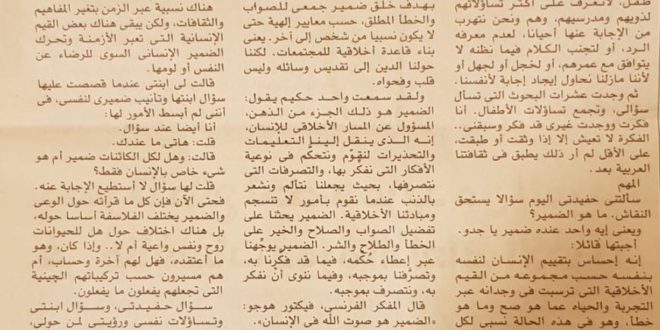Dad Badrawi writes in Al-Masry Al-Youm
Dialogue with my granddaughter about conscience
I was thinking of a research that I would conduct on a thousand children, in order to get to know most of their questions to their parents and teachers, and we sometimes evade answering them, because we do not know the answer, or to avoid talking about what we think does not correspond to their age, or because of shame or ignorance or because we are still trying to find an answer for ourselves.
Then I found dozens of research papers that ask my question, and collect the questions of children. I thought and found others who thought and preceded me.. The idea does not live unless it is documented or applied, at least I have not seen that applied in our Arab culture yet.
the important
My granddaughter asked me today a question worth discussing. What is a pronoun?
I mean, one has a conscience, grandfather.
I answered her:
It is a feeling of a person’s self-assessment according to a set of moral values that have been deposited in his conscience through experience and life about what is right and what is wrong, and in this case it is relative to each of the human beings. And the conscience blames a person for himself if this error becomes evident as a result of his evaluation of himself or sometimes as a result of others’ evaluation of him if he is very sensitive to others’ evaluation of him regardless of his personal values.
And conscience may exaggerate cruelty to oneself sometimes by exaggerating the estimation of mistakes.
But in fact, I don’t think I made it easy for her, and I might have complicated it.
And between myself and myself I said: It is possible that the essence of the philosophy of religions historically was with the aim of creating a collective conscience of absolute right and wrong, according to divine standards so that it is not relative from one person to another. It means building a moral base for societies. But we have converted religion to the sanctification of its means and not the heart and content.
And I heard a wise one say: Conscience is that part of the mind, which is responsible for the moral course of man. It is he who transmits to us instructions and warnings to evaluate and control the kind of thoughts we think, and the actions we act, so that it causes us pain and guilt when we do things that do not conform to our moral principles. . Conscience urges us to prefer the right, the good, and the good over the wrong, the bad, and the bad. The conscience directs us by giving its judgment on what we have thought and acted upon, and what we intend to think and act upon.
The French thinker, Victor Hugo, said: “Conscience is the voice of God in man.”
He also says in his genius book “Les Miserables”:
“Conscience is an arena in which desires and experiences compete, and a cave of thoughts that arouse in us the potential for shame or ugliness.”
The Greek philosopher Socrates says: “Just as the law prevents man from transgressing, so conscience prevents man from doing so.
evil deeds.”
But what is evil except the absence of good, and did it have relative meanings according to time?
The answer: Yes.
There is relativity over time to changing concepts and cultures, but there are still some human values that cross the times and motivate the human conscience to satisfy or blame oneself.
My daughter said to me when I told her her daughter’s question and my self-blame, that I had not made things simple for her:
I also have a question.
I said: Bring what you have.
She said: Do all creatures have a conscience, or is it something specific to humans only?
I told her a question I can’t answer. So far, everything that I have read about consciousness and conscience differs among philosophers about it, but there is a difference about whether animals have a soul and a conscious soul or not.. and if it is, and this is what I think, do they have an afterlife and a reckoning, or are they guided by their genetic structures that make them do what they do? .
The question of my granddaughter, the question of my daughter, the questions of myself and my vision of those around me, who reprimand themselves all the time, even for the mistakes or pains of others, and those who do not have a conscience to hold them accountable at all.. Disparities that made me think of easier, simpler answers and give readers reason to think.
And I start a group of articles about the most common questions of young children that their parents avoid answering or that they cannot simplify for them, and those that we believe that their age does not allow them to ask them at a time when knowledge has become available to everyone and there is no escape from the answer.
 Hossam Badrawi Official Website
Hossam Badrawi Official Website


